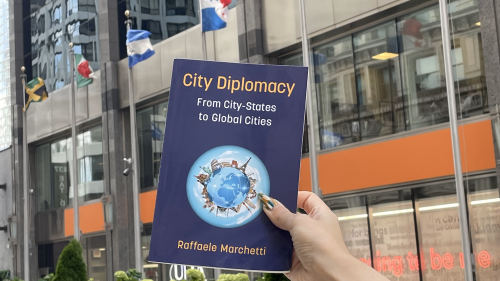City Diplomacy: Raffaele Marchetti on Cities as Global Actors

As part of our interview series with the shortlisted book award nominees, Raffaele Marchetti explores how cities are cities are shaping global affairs.
In August 2023, the Council announced the six-title shortlist for the inaugural 2023 Pattis Family Foundation Global Cities Book Award, which celebrates books that deepen our understanding of the role cities play in addressing critical global challenges. Over the coming weeks, we’ll be sharing interviews with the shortlisted authors discussing their books and the pressing issues facing cities today.
In City Diplomacy: From City-States to Global Cities, Raffaele Marchetti pushes back on the conventional view that only states can be global actors and highlights the significant diplomatic and cross-cultural activity taking place in cities today.
Marchetti is the deputy rector for internationalization and professor of international relations at the Department of Political Science and the School of Government of LUISS in Rome. He recently joined us for a conversation on the influences of his book. The author's responses have been lightly edited.
Q: Cities are not just places but are also becoming actors in shaping local and international policy. What lessons do you hope other cities take away from your book?
A: The key lesson that can be taken away from my book is about the expediency of practicing city diplomacy effectively. There are several risks but also many opportunities in going global. [By] not engaging in urban diplomacy, cities are not only missing many opportunities in social, cultural, political, and economic terms, but also [run] the risk of lagging behind in comparison with the other peers who compete on the global stage. [A risk of] projecting their city internationally, simply put, [is] mayors may end up facing discontent and not being reelected.
Q: What is the greatest challenge facing cities today and how do cities move forward?
A: With regards to the specific domain of city diplomacy, the greatest challenge facing cities today [is] raising awareness among both leaders and citizens. The mindset is still too inward looking in many cities and this is depriving them of opportunities for growth.
On the overall, cities will have to address a number of critical challenges in the years ahead. Overpopulation will be a major issue: cities were planned for a certain [number] of people, but the inhabitants will be in fact many more. We will have to reshape our urban policies in the areas of transportation, health, security, housing, data collection, and food. It will be an enormous endeavor.
Q: Which book(s) influenced you the most in crafting yours?
A: My training was in philosophy and political sciences. The most significant source in my research was the literature on global studies: globalization, transnational actors, and global governance. My book comes from there and has interpreted the international dimension of cities from this angle.
Perhaps two specific books helped to connect my previous interest in global studies with my current interest in cities. They are [Ben] Barber’s If Mayors Rule the World for the ambition to connect the democratic quality of our polities with the international urban dimension, and [Saskia] Sassen’s The Global City for its understanding of the transnational nature of our societies.
Q: What area of study did you intend your book to contribute to, and why did you choose that topic to write on?
A: This book is at the intersection of two areas and intends to contribute to both international relations and urban studies. The focus of my research has predominantly been on global issues. In the last few years, I got interested in non-state actors such as NGOs, companies, and local authorities. These actors increasingly are ripe for the opportunities provided by the global playing field, [either] by acting alone or at times in synergy with the national governments. On the overall, my research aims to study the complexity of global affairs beyond the classical state-centric view. Cities are very significant actors in this regard.
Q: What are you trying to achieve with your book?
A: In academic terms, my aim is to innovate my studies through interdisciplinary cross fertilization: Enhancing [international relations studies] with urban knowledge and vice versa enhancing urban studies with international relations knowledge.
But this book also aims to speak to a wider audience of practitioners. It intends to provide analyses and reflections to a broader audience of civic activists, local civil servant and policymakers, local politicians, but also how national governments, companies and NGOs that can coalesce with cities in advancing their global agendas.
The target audience is indeed global. For this reason, I am also happy the book was translated to French, Italian, Spanish and Russian, with a Chinese translation forthcoming. This will help to disseminate the ideas in different urban contexts.



